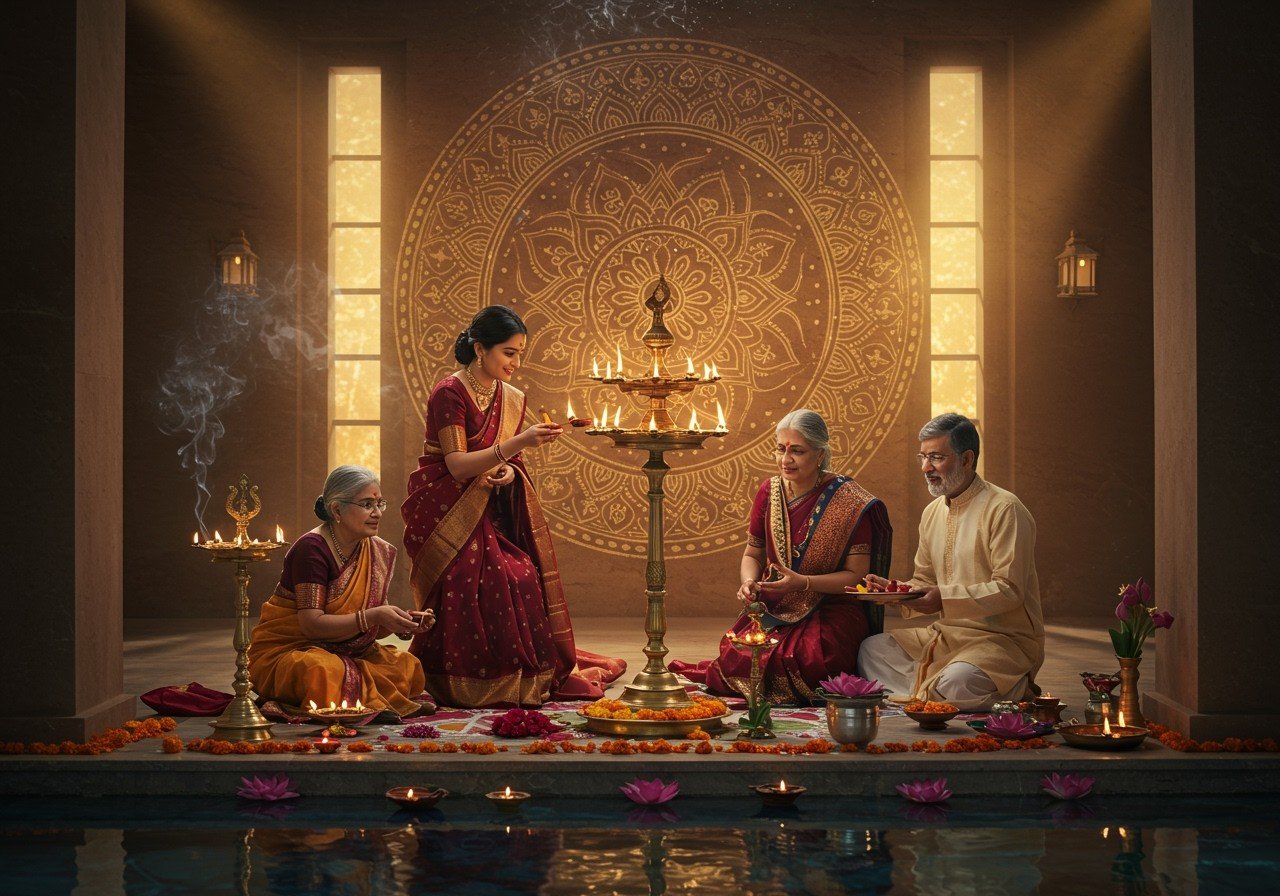
In the rich tapestry of Hindu practices, rituals, prayers, and festivals hold immense importance. For many Indians, these traditions are a way to connect with their roots, fostering a sense of belonging and continuity with the past. With the convenience of online shopping, accessing authentic ritual items has become easier than ever, helping devotees keep these traditions alive and vibrant.
Understanding Hindu Prayers: A Spiritual Journey
Hindu prayers are incredibly diverse and deeply meaningful, with various forms serving unique purposes. Mantras, sacred chants imbued with spiritual energy, help focus the mind and invoke divine blessings. Puja, a cherished daily ritual, involves offering prayers and symbolic items to deities, creating a personal connection with the divine. Aarti, the ceremonial offering of light, symbolizes the dispelling of darkness and ignorance, illuminating the path towards enlightenment.
Japa, the repetition of divine names, fosters deep meditation and cultivates spiritual discipline. Dhyana, the practice of meditation, offers a pathway to inner peace and self-realization. Sankalpa, the act of setting intentions before prayers, aligns our personal aspirations with our spiritual journey. Finally, Bhajans, devotional songs often sung together, nurture unity and express heartfelt devotion.
Hindu Festivals: Celebrating Life, Culture, and Spirituality
Hindu festivals are vibrant expressions of culture and spirituality, woven into the fabric of Indian life. Diwali, the Festival of Lights, celebrates the victory of good over evil and light over darkness, filling homes with warmth and joy. Ganesh Chaturthi, honoring Lord Ganesha’s birth, invokes wisdom, prosperity, and the removal of obstacles.
Holi, the Festival of Colors, ushers in the arrival of spring and the exuberance of life, painting the world in vibrant hues. Navratri, a nine-night festival dedicated to Goddess Durga, celebrates divine power, feminine energy, and purity. Raksha Bandhan, a heartwarming celebration of sibling love, honors the sacred bond between brothers and sisters. Makar Sankranti, a harvest festival, acknowledges nature’s bounty and the cyclical dance of seasons. Finally, Pongal, a Tamil harvest festival, expresses deep gratitude towards the Sun God and the gifts of nature.
Hindu Rituals: Unveiling Their Significance
Hindu rituals are laden with deep symbolic meaning, representing core values and cultural beliefs. Havan, the sacred fire ritual, symbolizes purification, offering prayers and gratitude to the deities. Vastu Shanti aims to harmonize the energies of our homes, creating a peaceful and balanced living space. Griha Pravesh, the housewarming ceremony, invokes blessings for prosperity and happiness in a new home. Learn more about the Significance and Importance of Hindu Rituals.
Karva Chauth, a testament to marital devotion, involves fasting by married women for their husbands’ long life and well-being. Upanayana, the sacred thread ceremony for boys, marks their initiation into spiritual education and adulthood. Antim Sanskar, the last rites, honors the departed soul and facilitates its journey in the afterlife. Annaprashan, a joyous occasion, celebrates a child’s growth and development with their first solid food.
Hindu Rituals: Connecting with the Divine and Preserving Our Heritage
Hindu rituals serve a multitude of purposes, each deeply intertwined with our spiritual and cultural lives. They are a pathway to connect with the divine, fostering devotion and deepening our understanding of the spiritual realm. Rituals also contribute to our personal spiritual growth, aiding in self-discovery and fostering inner peace. From seeking blessings for prosperity and fulfilling our goals in life (kama, artha, dharma) to ultimately striving for liberation (moksha), rituals provide a framework for our spiritual journey. Delve deeper into the Essence, Practices, and Meaning of Hindu Rituals.
Rituals are a powerful way to demonstrate our commitment to our faith and connect with our community. They help preserve our rich cultural heritage and the ancient wisdom passed down through generations, linking us to our ancestors. Finally, rituals provide an opportunity to honor and thank the elements of nature, recognizing their vital role in our lives.
The How and Why of Hindu Rituals
Hindu rituals often involve creating a sacred space, whether a home altar or a temple, symbolizing a sanctuary for the mind and spirit. Every element within a ritual, from the offerings presented to the mantras chanted, holds symbolic meaning, enhancing our understanding of complex spiritual concepts. Many rituals are performed collectively, strengthening community bonds and fostering a sense of belonging. Explore the Sacred Texts of Hinduism for a deeper understanding of these rituals.
The different types of Hindu rituals cater to various aspects of life. Daily rituals, including morning prayers, offerings to deities, meditation, chanting mantras like the Gayatri mantra, and reading scriptures, provide a structure for daily spiritual practice. Life-cycle rituals (Samskaras) mark significant life transitions, from birth (Jatakarma) and initiation (Upanayana) to marriage (Vivaha) and even the final rites (Antyeshti). Festivals, each with their unique rituals, punctuate the year with celebrations and spiritual significance.
Offerings and sacrifices have historically held a fundamental place in Hindu rituals. Puja, a core practice, demonstrates reverence to a god, spirit, or other divine aspects. Yajnas, where a small sacred fire is lit and offerings like food grains and ghee are presented while chanting mantras, are another example of ritualistic worship.
The Science Behind the Serenity: Rituals and Well-being
Beyond the spiritual, Hindu rituals also offer tangible benefits for well-being. The focused attention and repetitive actions involved in many rituals can reduce stress and anxiety, promoting a sense of calm. The mental focus required strengthens concentration and mindfulness. Participating in communal rituals strengthens social bonds and fosters a sense of belonging, while the structured practices encourage being present in the moment, deepening our awareness and mindfulness.
Modern Adaptations and Online Convenience
Hindu traditions are beautifully adapting to modern lifestyles. Online platforms now offer a convenient way to access authentic ritual items, making it easier for everyone to partake in these practices. Virtual pujas and online prayer services bring spiritual experiences into our homes, especially for those who may not be able to visit temples regularly.
Social media plays a vital role in spreading awareness about Hindu rituals among younger generations, bridging the gap between tradition and technology. Mobile apps help us track festival dates, auspicious timings, and even offer guided meditations, ensuring we don’t miss important events or opportunities for spiritual practice. Curated ‘puja kits’, readily available online, cater specifically to the needs of busy urban households, providing all the essential items for specific rituals in one convenient package. Online courses and resources offer in-depth knowledge about the significance of traditional practices and guide us on their proper conduct, helping preserve our cultural heritage for future generations.
Poojn.in understands the deep significance of these practices and provides a comprehensive online platform to access authentic puja items and resources. We offer complete puja samagri kits, readily prepared for specific festivals like Diwali and Navratri, as well as daily puja needs. Explore our Saraswati Puja Dashakarma Kit for a complete and convenient puja experience.
For those seeking individual items, we have a wide selection of pure copper and brass items, authentic dhoop and agarbatti, traditional puja thalis, sacred threads and mauli, and pure ghee diyas and wicks. Enhance your puja setup with our beautifully crafted hand-printed Baran Dala set.
We prioritize quality assurance, sourcing our products from verified traditional manufacturers who uphold authentic craftsmanship and use pure materials. Our detailed product descriptions explain the significance of each item, and we provide usage instructions in simple language, along with guidance on proper storage of puja items. Find pure Kalash Kumkum and Roli for your rituals. Our Hawan Samagri is carefully blended for sacred and fragrant ceremonies.
We provide convenient shopping options with home delivery across India, secure online payments, and cater to bulk orders for temples and organizations. Our customer support team is readily available via WhatsApp (9476142738) or phone (03369029784) to assist with specific festival requirements or custom puja kit requests. We ensure all items reach you in perfect condition, prepared for your sacred rituals.
Embracing Tradition with Modern Ease
As we continue to explore and practice Hindu traditions, we discover not only the richness of our rituals but also a profound connection to our culture and spirituality. These practices, whether prayers, festivals, or rituals, enrich our lives, fostering a sense of belonging, purpose, and continuity. Today, the harmonious blend of tradition and technology offers a unique opportunity, empowering us to participate in sacred rituals regardless of our location. This convenience ensures that the essence of these age-old practices remains vibrantly alive. As we embrace these traditions, let’s remember the stories and purposes they hold, guiding us towards spiritual fulfillment and a harmonious life, balancing the respect for ancient practices with the comforts of modern living.
Why is the Ganges River sacred? The Ganges, revered as Goddess Ganga, is believed to purify sins and is central to many rituals and ceremonies.
How is vegetarianism linked to Hindu practices? Many Hindus choose vegetarianism due to the principle of ahimsa (non-violence), showing respect for all beings.
What are the key elements of a temple visit? Temple visits involve offerings, prayers, lighting lamps, and communal interaction, promoting reflection and devotion.
Why is the cow considered sacred? The cow symbolizes life, sustenance, non-violence, and generosity, providing resources without harming life.
Shop Puja Essentials at Poojn.in


